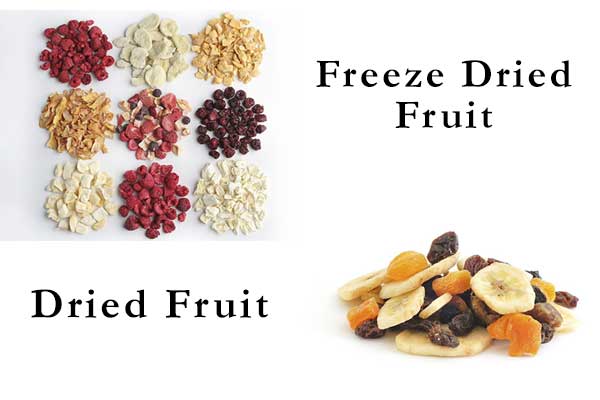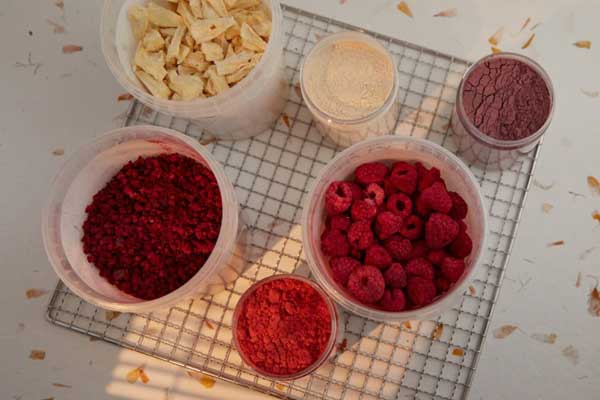Better Websites to own 2025
Jun 11, 2025

Ever wondered what’s the difference between freeze-dried vs dried fruit? Let’s discuss how they are different in terms of texture, shelf life, nutrition, and taste. This way you can decide which is best for your food preservation solution.
Freeze-drying (lyophilization) is a form of food preservation that involves removing water to extend shelf life or prepare food for transport.
It works by placing completely frozen food in a vacuum chamber. This helps the food retain its shape. With the help of low pressure, ice becomes gas without passing through the liquid phase. This happens through a process called sublimation.
Dehydration or drying, on the other hand, is another method of food preservation that also draws out moisture. The only difference is that it uses warmth, low humidity, and air current to dry out heat.
A heat source is needed to help moisture to evaporate. A low humidity environment allows moisture to move from the food to the air. Air current helps speed up the drying process by helping supply heat necessary for evaporation. It also helps remove water vapor from the food’s surface.

The difference between the two in terms of texture is highly noticeable.
When you freeze-dry fruit, you eliminate almost all of the moisture or water content. Since water leaves the fruit in the form of gas, what you get is dried fruit that’s airy, crispy, and crunchy.
For dried fruit, a third of moisture is still left behind. What’s left behind is a chewy and sweet preserved fruit.
When it comes to nutritional value, freeze-dried fruit takes the cake. Because of the low temperature applied, the vitamins and minerals in the fruit are left as is. This means about 97% of the fruit’s nutritional value is kept. This is because the freeze-drying process locks in the nutrients almost instantly.
As for dried fruit, only around 60% of the nutrients are intact. During the heat application, the vitamins and minerals in the fruit break down.
This makes freeze-dried fruit a better option than dried fruit when you need the best nutrition possible.

Those who tasted freeze-dried fruits will tell you that they taste almost the same as fresh ones. This makes it ideal for kids who love the sweetness and flavor of the fruit.
Dried fruit or dehydrated fruit retains the fruit’s original flavor as well. However, because heat destroyed some of the compounds in the fruit, it’s not as tasty as freeze-dried ones.
Another significant difference between freeze-dried vs dried fruit is shelf life.
Freeze-dried fruit can last for 25 up to 30 years stored at room temperature. This is because the process removes almost all of the moisture from the fruit. The ideal storage is packing them in air-tight Mylar bags with oxygen absorbers to make them last longer.
On the other hand, dried fruit can only last for 4-6 months because it still has a third of its moisture. The quality also degrades quickly in warm temperatures. It can last for up to a year at 60 degrees Fahrenheit. But when stored at temperatures of 80 degrees, dried fruit can only last for up to 6 months.
One thing to note, though, is that moisture in the environment affects the shelf life of freeze-dried and dried fruit. Each time you open the bag or container shortens the shelf-life, so it’s best to consume the fruit once opened.
Freeze-dried fruit wins over dried fruit in terms of texture, nutrition, taste, and shelf life. Cold temperatures preserve the integrity of the fruit physically and chemically. Nutrients are locked as vitamins and minerals don’t react to freezing temperatures as they do with heat.
Shelf life is also considerably longer for freeze-dried fruit, making it the best option for stocking up on fruit. You don’t’ have to worry about food wastage as it can last for years in room temperature in a dry environment. You can get to enjoy the true flavors of fruit even when it’s no longer in season.
Have you tried both freeze-dried and dried fruit? Share with us your experience and your preference in the comment section below!